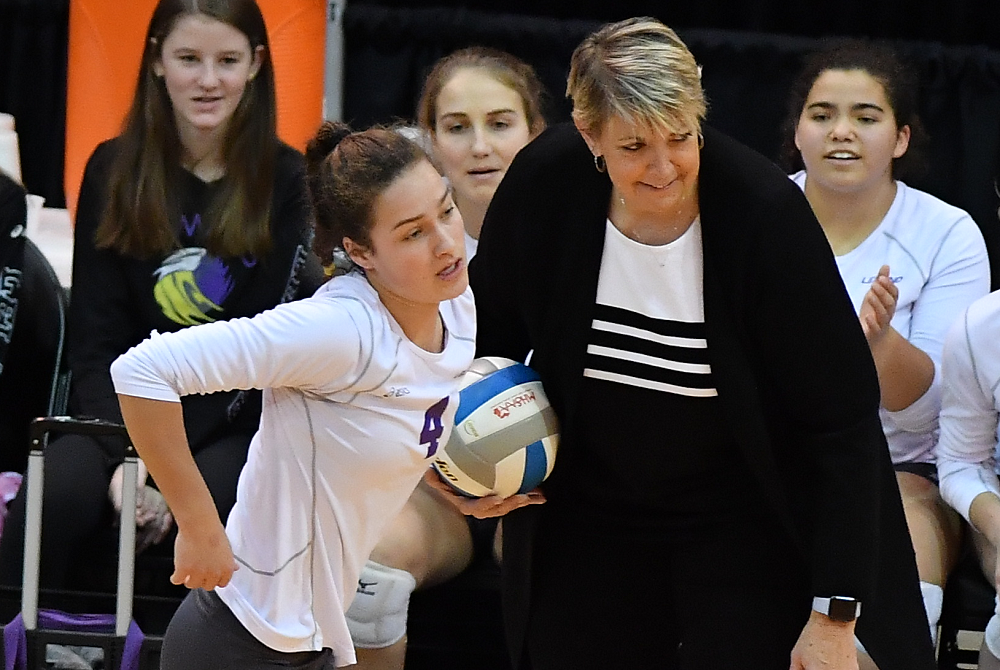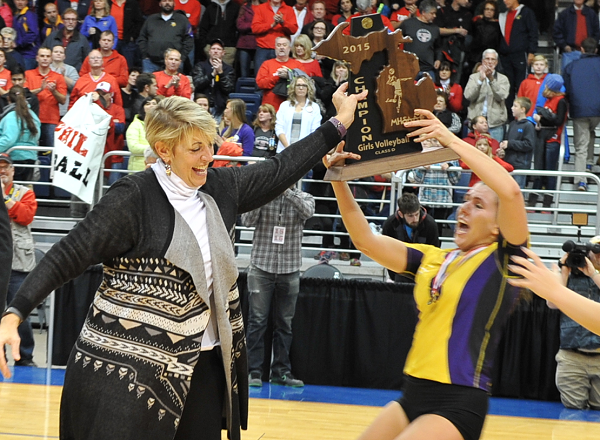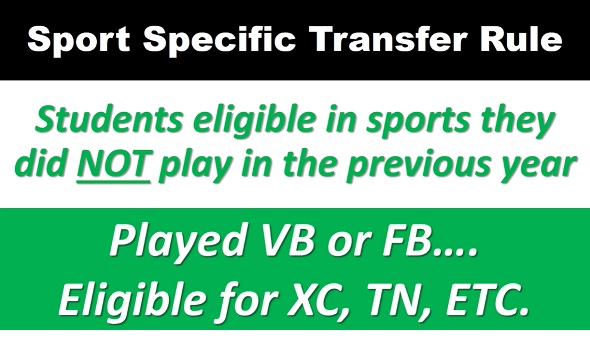
2023 WISL Award Honoree Glass Continuing to Create Leaders On Court & Off
By
Geoff Kimmerly
MHSAA.com senior editor
March 2, 2023
Hailing from one of Michigan’s smallest communities, Laurie Glass has made an impact that continues to connect all over Michigan.
But her impact on women’s athletics began long before a career that has seen the longtime Leland volleyball coach become one of the winningest in her sport in state history.
As a high school junior in 1976, she recruited seven classmates and a coach to form Leland’s first girls sports team – for basketball – and the same group then played volleyball that winter. She was a senior and major contributor when, during their second season, the Comets won the 1978 Class D volleyball championship.
More than four decades later, Glass is a Michigan legend in that sport – a winner of 1,218 matches with Leland and Traverse City Central and three Finals championships with the Comets. She’s also a nationally-recognized voice in volleyball and women’s athletics as a whole – and this year’s MHSAA Women in Sports Leadership honoree for those many and continuing contributions.
“Because I’m a teacher and coach, that’s my desire to help the youth be the best they could be. And if I can impact a coach or impact another district or program, that means I’m affecting more youth in a positive way,” Glass said. “So for me, it’s just the ripple effect; it gets a lot bigger when I’m starting little drops in other places. So I can affect the hundreds of kids that I’ve seen go through Leland, or I can impact the larger audience by impacting coaches or impacting kids in other places that can then impact other people. It allows me a wider audience for wanting to help young women to be their best young woman self in however way I can make that happen.”
Each year, the Representative Council considers the achievements of women coaches, officials and athletic administrators affiliated with the MHSAA who show exemplary leadership capabilities and positive contributions to athletics.
Leland finished 49-13 this past season and reached the Division 4 Quarterfinals. Glass has a record of 1,218-393-122 over more than three decades as a varsity volleyball coach, having led the Comets for a combined 29 seasons over three tenures, the first beginning with the 1989-90 winter season and later picking up with her most recent return for Fall 2010. She also coached Traverse City Central for four seasons beginning in 1991-92.
 Glass led Leland to Class D Finals championships in 2002, 2006 and 2015, and runner-up finishes in Class D in 2014 and Division 4 in 2018 and 2019. She was named to the Michigan Interscholastic Volleyball Coaches Association (MIVCA) Hall of Fame in 2006, and selected as national Coach of the Year in volleyball in 2014 by the National Federation of State High School Associations (NFHS) Coaches Association. She’s a three-time MIVCA Coach of the Year and was named Michigan High School Coaches Association (MHSCA) Coach of the Year for volleyball in 2015. She also was a finalist for National High School Athletic Coaches Association (NHSACA) national Coach of the Year in 2014.
Glass led Leland to Class D Finals championships in 2002, 2006 and 2015, and runner-up finishes in Class D in 2014 and Division 4 in 2018 and 2019. She was named to the Michigan Interscholastic Volleyball Coaches Association (MIVCA) Hall of Fame in 2006, and selected as national Coach of the Year in volleyball in 2014 by the National Federation of State High School Associations (NFHS) Coaches Association. She’s a three-time MIVCA Coach of the Year and was named Michigan High School Coaches Association (MHSCA) Coach of the Year for volleyball in 2015. She also was a finalist for National High School Athletic Coaches Association (NHSACA) national Coach of the Year in 2014.
Glass has spoken multiple times at the MHSAA Women In Sports Leadership Conference and several times at the MIVCA Coaches Clinic, and among various other engagements was the featured speaker at the Nebraska Athletic Association Coaches Clinic. She will receive the Women In Sports Leadership Award during the MHSAA Division 1 Girls Basketball Final on March 18 at Michigan State University’s Breslin Center.
“Laurie Glass is recognized most on the statewide level for leading one of the most successful volleyball programs in state history. But she is known among her peers most for the way she teaches not only volleyball but life skills to her athletes,” MHSAA Executive Director Mark Uyl said. “Her leadership creates more leaders, be they the athletes who have the opportunity to play for her or the coaches who learn from her and receive her mentorship.”
Glass’ roots are in one of the most accomplished athletic families in Michigan high school history.
Her father Larry Glass coached Northwestern University’s men’s basketball program from 1963-69, and later took over the Leland girls basketball program and led the Comets to a 388-110 record and three straight Class D Finals championships (1980-82) over two tenures from 1977-91 and 2000-05. Laurie’s sister Rebecca McKee played basketball at Leland and Michigan State University, and her brother Michael Glass played basketball at Lansing Community College before also becoming a high school and college coach.
Laurie also coached and parented arguably the most accomplished volleyball player – and perhaps top female athlete across all sports – in Michigan high school history. Her daughter Alisha Glass-Childress graduated from Leland in 2006 with national records for career kills, aces and blocks, and the first two still top those respective lists. Alisha, also an all-state basketball player, went on to star on the volleyball court at Penn State and as the U.S. Olympic team setter in 2016 in helping that team to the bronze medal.
Larry Glass’ lessons still ring true as Laurie passes them on to another generation. One of her favorite sayings from her father was “you can’t take money out of the bank until you put money in” – in essence, a coach can’t expect athletes to accept criticism or a hard ask if that coach first hasn’t invested in them. Another of her dad’s themes involved making sure players learned fundamentals at young ages and improved on them at all levels, whether they won games or not during those early years. As one of his middle school coaches, that stuck with her, and it remains a basic component of her coaching.
“I’ve always said that we compete with teams that are way more athletic, have all the things on paper that should beat us. And the fact that we know how to be a really good team is what allows us to beat people who on paper should be better than us,” Laurie Glass said. “I’ve always valued the time spent on culture and team because that’s the advantage we hold. We’re never going to be the tallest or most talented – Alisha being the anomaly, of course.”
Laurie Glass has served on the MIVCA Executive Board, including as president, and is a member of the MHSCA and American Volleyball Coaches Association (AVCA). Locally, her program annually hosts the Forever Dig Abby match in honor of former player Abby Gross, who died after a fight against cancer in 2015. Proceeds most years go to benefit another community member battling the disease, and this past season went to a fund for efforts related to ovarian cancer.
Glass has served nearly 35 years in education and retired from her duties as a behavior intervention specialist and special education teacher in the Traverse Bay Area Intermediate School District in 2019. She has returned to the school setting, however, and is in her second year as a behavior intervention specialist at Leland.
Glass earned a bachelor’s degree in special education with an endorsement in emotional impairment from Western Michigan University in 1988, and has done master-level coursework in education administration and technology. She also is a certified instructor for the Crisis Prevention Institute. Glass first attended Grand Valley State University and played a season of volleyball before transferring. (NOTE: Glass also coached the Kalamazoo Central varsity for two seasons during the mid-1980s. Those records are unavailable currently but will be added to her overall record when research is complete.)
Past Women In Sports Leadership Award Winners
1990 – Carol Seavoy, L’Anse
1991 – Diane Laffey, Harper Woods
1992 – Patricia Ashby, Scotts
1993 – Jo Lake, Grosse Pointe
1994 – Brenda Gatlin, Detroit
1995 – Jane Bennett, Ann Arbor
1996 – Cheryl Amos-Helmicki, Huntington Woods
1997 – Delores L. Elswick, Detroit
1998 – Karen S. Leinaar, Delton
1999 – Kathy McGee, Flint
2000 – Pat Richardson, Grass Lake
2001 – Suzanne Martin, East Lansing
2002 – Susan Barthold, Kentwood
2003 – Nancy Clark, Flint
2004 – Kathy Vruggink Westdorp, Grand Rapids
2005 – Barbara Redding, Capac
2006 – Melanie Miller, Lansing
2007 – Jan Sander, Warren Woods
2008 – Jane Bos, Grand Rapids
2009 – Gail Ganakas, Flint; Deb VanKuiken, Holly
2010 – Gina Mazzolini, Lansing
2011 – Ellen Pugh, West Branch; Patti Tibaldi, Traverse City
2012 – Janet Gillette, Comstock Park
2013 – Barbara Beckett, Traverse City
2014 – Teri Reyburn, DeWitt
2015 – Jean LaClair, Bronson
2016 – Betty Wroubel, Pontiac
2017 – Dottie Davis, Ann Arbor
2018 – Meg Seng, Ann Arbor
2019 – Kris Isom, Adrian
2020 – Nikki Norris, East Lansing
2021 – Dorene Ingalls, St. Ignace
2022 – Lori Hyman, Livonia
PHOTOS (Top) Leland coach Laurie Glass confers with one of her players during the 2019 Division 4 Final at Kellogg Arena. (Middle) Glass passes the championship trophy to her team after the Comets won the 2015 Class D title.

Brush Up on the New Transfer Rule
July 18, 2019
By Rob Kaminski
MHSAA benchmarks editor
Eligibility under the new “sport-specific” transfer rule begins this coming fall after circulating extensively for nearly one school year.
Unless one of the stated 15 exceptions is met, participation during the 2018-19 school year determines eligibility for 2019-20.
The new rule adopted by the Representative Council at its May 2018 meeting has found support among most audiences. A transfer student’s eligibility in 2019-20 is based upon that student’s participation from this past school year (2018-19). It will be paramount for administrators and coaches to have awareness of the sports a transfer student participated in during the previous school year.
The long-standing 15 Exceptions to immediate eligibility, such as a full and complete residential change or a student moving between divorced parents by completing of an Educational Transfer Form, did not change.
One might call the rule on the way out “The Fourth-Friday Transfer Rule.” Under this old rule, when a student enrolled at the new school determined his or her eligibility. Under the new Sport Specific Transfer rule, what a student played in the previous season determines eligibility.
The Council passed a more lenient rule on the one hand and more restrictive on the other. The more lenient aspect is a change that finds a transfer student ELIGIBLE in any sport in which he or she did not participate in a game or a scrimmage in the previous school year.
The more restrictive portion tends to discourage students who change schools for sports reasons. A transfer student who did play a sport in the previous season – and who does not meet one of the 15 Exceptions – is NOT ELIGIBLE in that sport for the next season. If a student changes schools in mid-season, the student would be ineligible for the rest of that season in that sport and the next season for that sport.
Participation under this and other rules means playing in an interscholastic game or scrimmage after starting the 9th grade at any high school. It does not mean practice, but entering an interscholastic game, meet or scrimmage in any way. It also may involve more than one sport, so a three-sport athlete who does not have a residential change and transfers would be ineligible in those sports during the next school year – but eligible for any other sport. It also means a student cut from a team – one who never entered a scrimmage or game – may transfer and play without delay for that new school’s team. It may also mean that a student who meets one of the stated exceptions such as a residential change but enrolls in a school other than her or his school of residence, would have eligibility in sports not played in the previous year.
The new rule will tend to discourage students from changing schools for sports because they would be ineligible in any sport they have played in school the previous season for that sport. It will increase participation for some students who were otherwise not eligible under the current rule.
It is always best to contact school athletic directors who can connect with the MHSAA to verify eligibility prior to enrollment.
If the student’s new school requests in writing, the MHSAA Executive Committee may approve a waiver that reduces the period of ineligibility to 90 scheduled school days at the new school if the change of schools was for compelling reasons demonstrated with outside documentation having nothing to do with sports, curriculum, finances, and school demographics. The Executives Committee also has authority to approve immediate eligibility.

